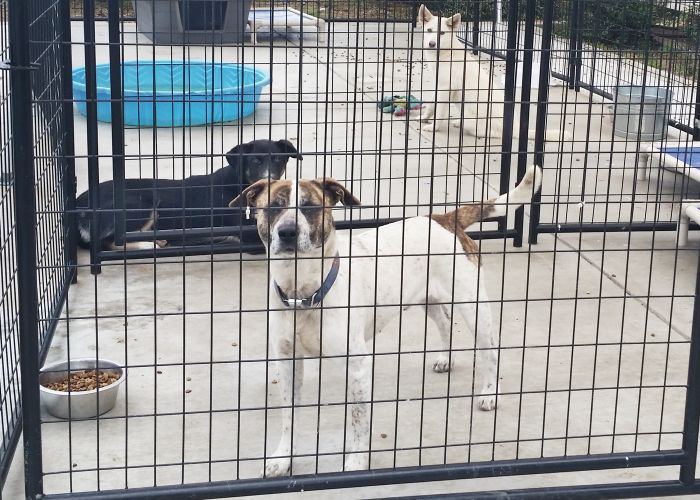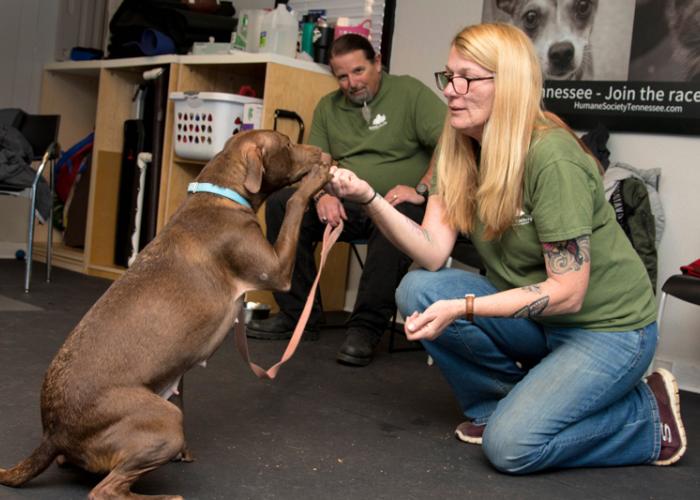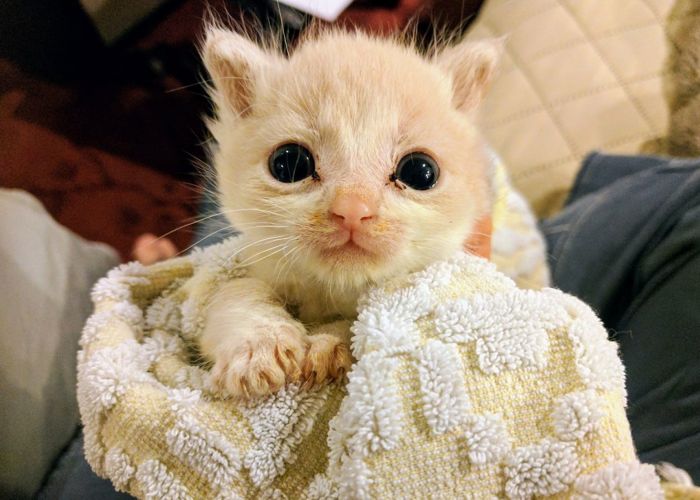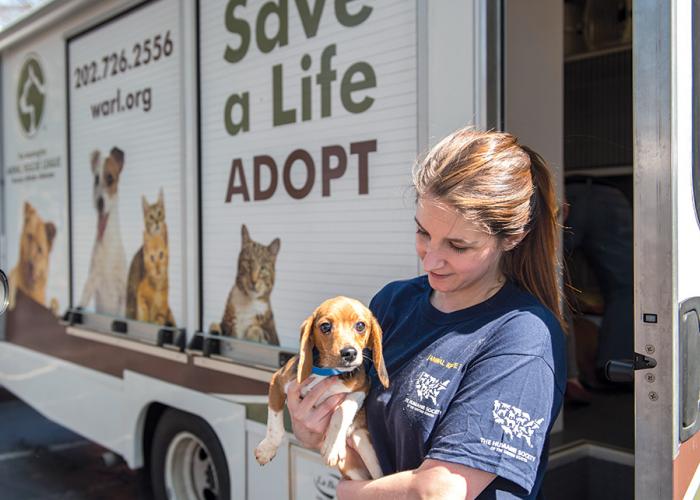Humans of Animal Advocacy: Dr. Kwane Stewart
Project Street Vet co-founder describes his calling to serve some of society’s most vulnerable people and their animals
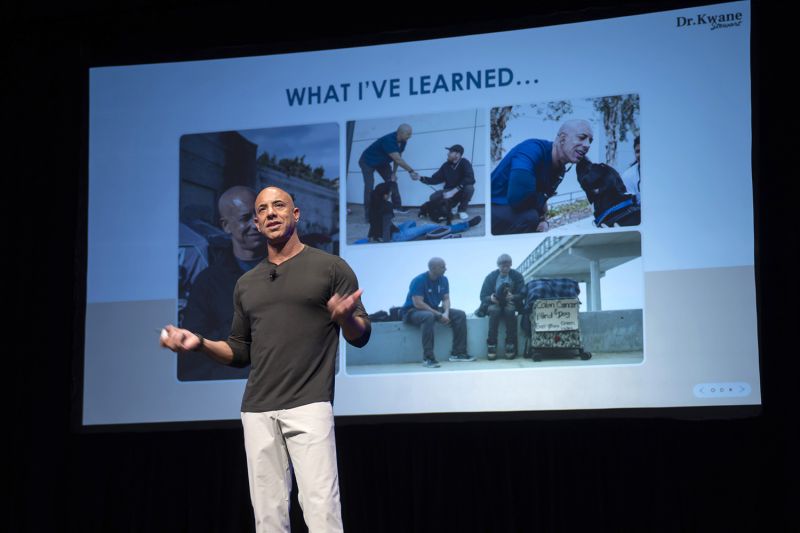
In middle school, when all his friends were obsessed with Star Wars, Kwane Stewart’s favorite movie was The Black Stallion. He’d always loved animals, and the story of a boy who befriends a wild stallion affected him so much that he vowed he was going to be a veterinarian.
That commitment took him through college and vet school. After graduating in 1997, he began working in private practice in an affluent area of San Diego. Things were different when he later moved to California’s Central Valley and took a job at a municipal animal shelter.
Located in an economically depressed community, the shelter was overwhelmed and underfunded. Faced with the daily task of determining which animals would be euthanized for space, Stewart became depressed and started to experience panic attacks.
He was on the brink of leaving his job and his profession when he encountered a man who was living on the streets with his dog. Stewart provided medication to treat the dog’s flea dermatitis—and realized how that small act of kindness greatly improved both the dog’s and the owner’s lives.
As Stewart describes in his book, What It Takes to Save a Life: A Veterinarian’s Quest for Healing and Hope, the experience renewed his faith in himself and his profession. It gave him the emotional fortitude to initiate a trap-neuter-return program and other lifesaving changes at the shelter during the rest of his five-year tenure there. In his spare time, he began walking around areas experiencing high rates of homelessness, talking with people and offering free medical treatments for their pets.
In 2020, Stewart co-founded Project Street Vet, which is dedicated to bringing free veterinary care and supplies to homeless people and their pets. The nonprofit’s motto: “No Judgment. Just Help.”
In this edited interview, which originally aired on the Humane Voices podcast, Stewart chats with Chad Sisneros of the HSUS about the future of Project Street Vet and how he maintains resilience.
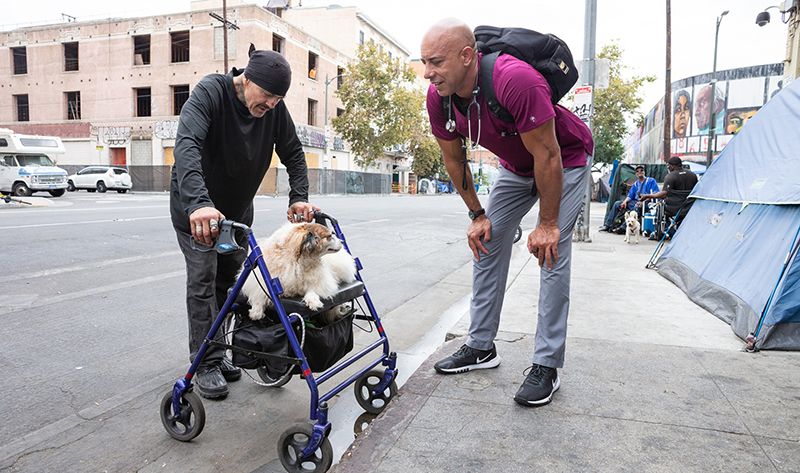
Can you describe how helping one man and his dog led you to co-found Project Street Vet?
That was back in about 2011 after I met this gentleman outside of a 7-Eleven. And the encounter changed my whole perspective on treating pets who otherwise would maybe never get care. It never really dawned on me until that moment how easy and how inexpensive it was to pull an animal out of suffering. It was a few minutes of my time, a basic flea treatment, and it changed that dog’s life and the owner’s life. And it changed my life, because I realized how impactful this is.
That started this 13-year journey, and for about six of those years, I just did it by myself. I would walk up and down our city streets looking for unhoused people with pets.
Initially, it was coming out of my own pocket—medicine and treatments—and there were times I would pass up on paying my student loans to honor my commitment to help the pets. My brother came along and said, “If you really want to kick-start this, let’s get some funding.” So we became an official nonprofit in 2020.
There are a lot of misconceptions about people who don’t have homes but have pets. Is that something you encounter when you talk to people about Project Street Vet’s mission?
If I’m being honest, I probably had some of those same misconceptions until I really got to know the people. Once I started understanding their situation, I realized how the judgment that we pass so easily was unfair and unwarranted and that a lot of these people are no different than you and me.
They’re struggling, a lot of them economically, which leads them to the streets. Then they sometimes turn to substance abuse to help cope. Some of them develop depression or anxiety as a result of being unhoused. I might end up just like a lot of them if I didn’t have a home or friends or family to lift me up. I might turn to some of those coping mechanisms.
But their relationship with their pets is very similar to all of ours. I would even say that in most cases it’s better. Because they spend just about every hour of every day with their pet, and that’s all a pet really wants. They want their person. So they have a kind of bond with their pets that I just don’t typically see in clinical practice.
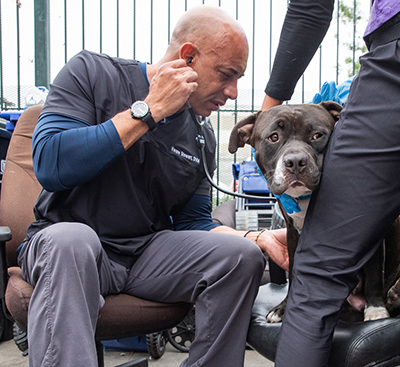
What are the most common conditions you see in the pets you’re treating?
I’m licensed in California, and I do most of my work at Skid Row in Los Angeles and in San Diego. We see a lot of skin allergies and ear problems. I carry a little war chest of medicines and other stuff that can address those. That covers the majority of what I see on the streets. (For pets with more complex issues or who need medical care that involves anesthesia, Project Street Vet arranges for them to be treated at a partnering veterinary clinic.)
Your book is both a memoir and an exploration of how our society treats its most vulnerable members. What kind of feedback is the book getting?
It’s being well-received, and the stories seem to resonate with people. I put a lot of my heart and soul into it. There’s a lot of very personal stuff included. I struggled with depression myself for some years at the shelter, so I discussed that and then how to keep yourself moving through it.
It’s funny enough, but I’m getting some nice interest to turn the book into a movie. And I’ve even had a big A-list star reach out to me to express his interest to play me in the movie. No promises—these things are early in the process.
Do you have any advice for people who want to do similar work?
The homelessness issue is obviously a huge issue in our country. There are some days I go home and it’s overwhelming to me, and I just have to tell myself “one dog at a time.” And I get up, and I just try to find one more dog I can help.
If you want to help the impoverished or the unhoused people in our country, I would say the first step is not to ignore them. A lot of times, people just want to be seen and receive a nice gesture, a hello, acknowledging that they’re not invisible.
If you want to help their pets, talk to your own veterinarian and ask them, “Hey, would you sponsor from time to time one unhoused pet pro bono?” I will tell you that the reward to the morale of the staff and those who help this dog or cat who may not receive treatment if it wasn’t for them, it’s immense.
What’s next on the horizon for you and Project Street Vet?
I’m now off to go give a commencement speech to a graduating veterinary class. I’m very excited about that. And then I’m going to keep expanding the Project Street Vet program. We’re in seven cities now, including New York, where we launched in December 2023. And now we have our eyes set on other big cities.
I have this dream that if I can push my way into the 15 largest cities in the country, I will cover about 75% of our unhoused population and their pets.


